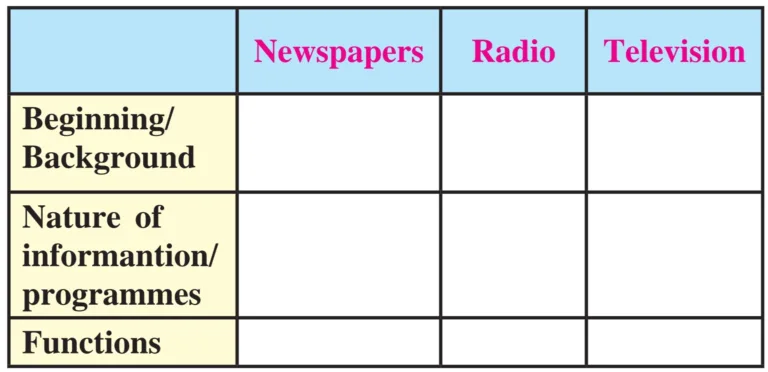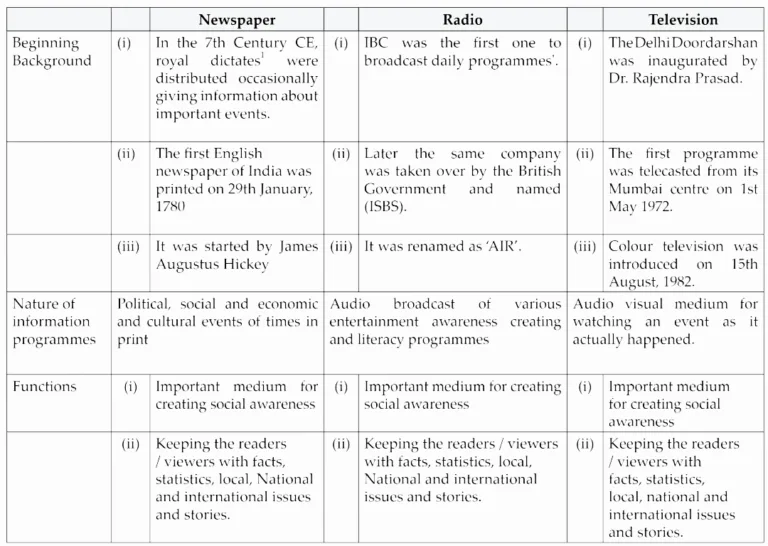Chapter 5 - Mass Media and History
1. (A) Choose the correct option from the given options and complete the statement.
(1) The first English newspaper in India was started by ………
(a) James Augustus Hickey
(b) John Marshall
(c) Allen Hume
(d) Balashastri Jambhekar
Ans: (a) James Augustus Hickey
(2) Television is an ………… medium.
(a) visual
(b) audio
(c) audio-visual
(d) tactile
Ans: (c) audio-visual
(B) Identify and write the wrong pair in the following set.
(1) ‘Prabhakar’ – Acharya P.K. Atre
(2) ‘Darpan’ – Balshastri Jambhekar
(3) ‘Deenbandhu’ – Krishnarao Bhalekar
(4) ‘Kesari’ – Bal Gangadhar Tilak
Ans: The wrong pair is:
‘Prabhakar’ – Acharya P.K. Atre
Explanation: Prabhakar newspaper was started by Bhau Mahajan.
2. Write short notes.
(1) The role of newspaper in the Indian struggle for independence
Ans: Newspapers played an important role in the Indian independence struggle. It is as follows:
(i) Newspapers served as an important medium for creating social awareness during those times.
(ii) They described the greatness of Indian culture and history to gather the support of the masses for the freedom movement. They imparted a kind of nationalistic education.
(iii) They supported social, religious, and political movements and opposed imperialism.
(iv) They discussed various social and political issues. The ideas of social reformers, national leaders, and various organizations active in the independence struggle reached people through newspapers.
(2) Why do we need mass media?
Ans:
There is a need for mass media due to the following reasons:
(i) It facilitates the free flow of information to all strata of society.
(ii) People are able to watch an event as it actually happens.
(iii) Mass media is a means of entertainment. It also provides information required for educational and professional development. Television enabled a wider reach of these programs.
(iv) Mass media is very important as it plays an important role in strengthening democracy.
(3) Mass Media and professional opportunities.
Ans:
(i) There are many professional opportunities available in printed, electronic, and digital media.
(ii) Writers, columnists, and editors are required to write articles, columns, and editorials in newspapers.
(iii) Newspapers also require reporters to gather news and technicians to work in the press.
(iv) There is a requirement for actors and technicians in electronic media.
(v) Artists are required to present programmes on television in the same way news presenters and anchors are required.
(vi) If the articles, columns, and programmes are based on history, an expert in history is required.
3. Explain the following statements with reasons.
(1) Any information received through mass media needs to be reviewed critically.
Ans:
(i) There was an event of inauthentic information. appearing in a print in Germany.
(ii) A German weekly magazine had purchased a number of so-called handwritten diaries of Adolf Hitler and sold them to various publications.
(iii) Later those dairies were proved to be forged.
(iv) So any information received through mass media needs to be received critically.
(2) Knowledge of history is essential for newspaper articles.
Ans:
(i) Newspapers while providing fresh news to its readers need to unfold the background of an event.
(ii) While reporting news in detail, reporters try to compare it with parallel events, which happened in the past.
(iii) In order to be able to publish an issue to commemorate the occasion, one needs to review history.
(3) Television is the most popular medium.
Ans:
(i) Television is an audio visual medium
(ii) It is possible for this medium to cross the inherent limitations of newspaper, radio and show the actual visuals of an event to people.
(iii) There is no other alternative than television available, for watching an event as it actually happened.
(iv) So television is the most popular medium.
4. Read the following extract and answer the questions.
Radio : ‘Indian Broadcasting Company’ (IBC), a private radio company was the first one to broadcast daily programmes. Later the same company was taken over by the British Government and named as, ‘Indian State Broadcasting Service (ISBS). On 8th June 1936 it was renamed, as ‘All India Radio (AIR)’.
After Independence, AIR became an integral part of the Ministry of Information and Broadcasting (India). Initially, it broadcasted Governmental programmes and schemes. It was named as ‘Akashvani’ on the suggestion of the famous poet Pandit Narendra Sharma. Akashvani broadcasts various entertainment, awareness creating and literary programmes. It also broadcasts special programmes for farmers, workers, the youth and women. The ‘Vividh Bharati’ programmes are broadcasted in 24 regional languages as well as 146 dialects of Indian languages. Lately, various new channels like ‘Radio Mirchi’ are providing radio services.
(1) Akashavani (AIR) is an integral part of which ministry?
Ans: Akashvani is an integral part of the Ministry of Information and Broadcasting (India).
(2) What was the new name of IBC?
Ans: The new name of IBC is AIR (All India Radio).
(3) In how many regional languages and local dialects are ‘Vividh Bharati’ programmes broadcasted ?
Ans: The Vividh Bharati programmes are broadcasted in 24 regional languages as well as 146 dialects of Indian languages.
(4) How was AIR named ‘Akashavani’ ?
Ans: ‘AIR’ was named Akashvani on the suggestion of the famous poet Pandit Narendra Sharma.
5. Complete the following table.

Ans:

